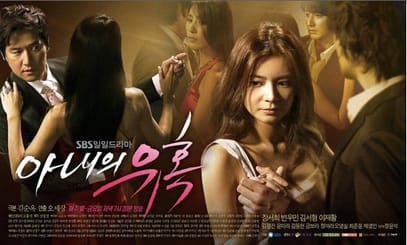makjang

This word came to my attention recently when a friend used it to describe the American television series E.R. (1994–2004), about the frantic lives and loves of the staff at an inner-city Chicago hospital emergency room. Makjang describes a drama, usually a television drama and a Korean one (K-drama) at that, that uses outrageous and highly melodramatic storylines to keep viewers hooked. The word is a slang variant of the Korean 끝장 (kkeutjang, the end, a doomed situation), from 끝 (kkeut, end, final) + 장(張) (jang, page, (of a book).
I don’t have the expertise to trace the use of the word in Korean, but the earliest example in English that I’ve found is a post from 9 July 2010 in A Koala’s Playground, a blog about K-dramas:
Temptation of Wife—Long-suffering wife gets dumped for prettier mistress and is almost offed in the process. She returns after a personality and physical appearance makeover to make her shitty ex-husband, his bitchy new wife, and her cruel former in-laws all pay for their crimes. Yay for female Bao Chou! Boo for all the makjang histrionics. It would have been easier to report them to the police.
And there is this from the English-language newspaper The Korea Times of 10 September 2013. The word appears in a regular column teaching Korean to English speakers. I’ve omitted the Hangul characters that were in the original:
891 Makjang TV drama
Makjang dramas are similar to American soap operas.
makjang deurama-neun migu-gui yeonsok-geukgwa biseut-haeyo.
The characters and plot are completely over the top. Murder sarin
inmul seong-gyeokina guseong-eun wanjeon-hi gwajang-doen geosiyeyo.
Common themes include murder, gangs, and adultery.
butong makjang deurama-ui juje-neun sarin, kkang-pae geurigo bullyun iyagi-yeyo.
My cousin’s life is like a makjang drama. Sensational jageuk-jeogin
je sachon insaeng-eun makjang-deurama gatayo.
The word makjang literally means the end of a mine shaft, a dead end. The characters and plot elements of these shows are very extreme and can’t get any more outrageous. They couldn’t exist in the real world.
Temptation of Wife is a famous makjang drama that’s commonly referenced for it’s [sic] absurdity.
Secrets about one’s birth chul-saegui bimil
Revenge boksu
With the availability of K-dramas growing in the anglophone world, thanks to streaming video services, the word is likely to become more familiar to English-speakers in coming years.
Sources:
Koala, O. C. “Bao Chou—The Revenge Meter in Dramas.” A Koala’s Playground (blog), 9 July 2010.
Meyer, Chad and Moonjung Kim. “891 Makjang TV Drama.” Korea Times (Seoul), 10 September 2013, 18. ProQuest Historical Newspapers.
Myweithisway. “Makjang 101: Taking Things to the Extreme.” Reddit r/KDRAMA, 2020.
Wiktionary, 18 August 2023, s.v. 끝장.
Image credit: SBS Television. Wikipedia. Fair use of a low-resolution copy of a copyrighted image to illustrate the topic under discussion.